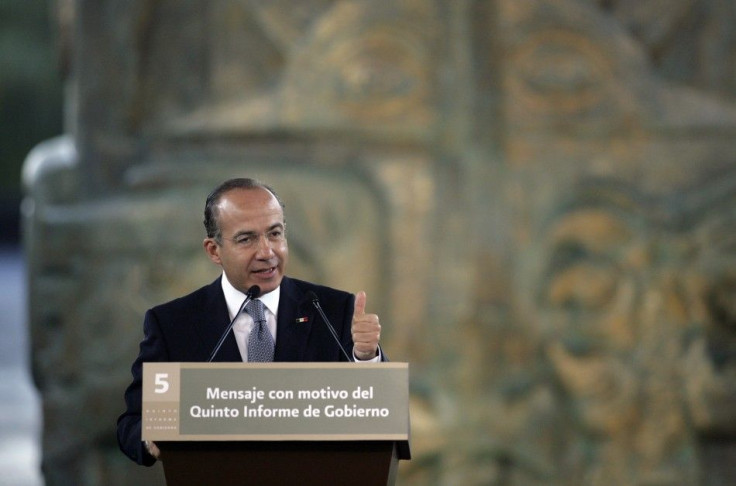Mexico's Drug War: Can President Calderon Win?

Mexico's President Felipe Calderon told his nation Friday that he will continue the offensive against violent drug cartels.
For the past few years, Mexico has been suffering from a nearly ubiquitous pandemic of gang activity that results in thousands of deaths per year.
Since October 2010, about 50 police officers have been killed, the most recent on Thursday in Ciudad Juarez, a city near El Paso, Texas that has become one of Mexico's most terrifying areas. Additionally, the murder of Jose Eduviges Nava Altamirano in Zucuaplan in August brought the number of mayors killed by drug cartels since 2010 up to 19.
Two weeks ago, a group called the Zetas set fire to a casino in Monterrey, burning 52 people to death.
It is evident that we are not facing common criminals. We are facing true terrorists who have surpassed not only the limits of the law but basic common sense and respect for life, Calderon said in a speech Friday.
The only way to beat this cancer is for this strategy to persevere, the president said.
Drug-related violence in Mexico exploded in 2006 when Calderon launched a war against organized crime. Since then, more than 41,000 people have been killed, including civilians, tourists, government officials and soldiers.
But Calderon is insisting that his crackdown is not responsible for the violence. He claims that cartel expansion, as well as the United States' insatiable appetite for illegal narcotics is to blame, and that retaliation has nothing to do with it.
The armed forces are not part of the problem, but part of the solution, Calderon said. If we hadn't done anything, instead of the utopian country some think we would live in, we'd be overtaken by the cartels.
Despite the relentless stream of violence, government forces have made a number of high-profile arrests recently.
In August, police captured Jose Antonio Acosta Hernandez, known as El Diego, who is thought to be the leader of the La Linea gang, the enforcement arm of the Juarez cartel in the northern state of Chihuahua.
Acosta, who is a former policeman, admitted to ordering the murders of 1,500 people. He is also thought to be involved with the death of three people with ties to the U.S. Consulate, including a consulate employee and her husband, in 2010.
In June, police captured Acosta's second-in-command. Marco Antonio Guzman Zuniga, who is nicknamed El Brad Pitt, was arrested on charges relating to a car bomb detonated outside a police station last year. Guzman is also thought to be behind hundreds of murders.
Some shocking arrests have revealed an unimaginable depravity at the heart of this war. Edgar Jimenez Lugo, a 14 year-old San Diego boy, was convicted of murder, kidnapping and torture in July. Jimenez was arrested in Mexico in December, and admitted to decapitating four men for the South Pacific cartel.
Police caught the boy, along with his sister, trying to board a plane to Tijuana. Lugo said that he was trying to flee to San Diego to see his mother and that the cartel had kidnapped and drugged him and forced him to kill.
Earlier this year, police caught a 16-year-old girl trained to be an assassin by the Zetas gang. The Zetas also allegedly employed a 13 year-old girl who was caught in August.
While Calderon is making some progress, each big-name capture creates new challenges. When one cartel leader is arrested or killed (often in shootouts with police) a rift forms in that cartel. In many instances, a fight for power between two deputies can leave hundreds dead in just a short time, and thousands dead in the long term as rival gangs vie for turf.
That is the situation in Juarez, as well as Acapulco, where authorities recently discovered a mass grave, as well as the decapitated heads of five unknown people in a Sam's Club parking lot.
Additionally, a July report that found that more than 400 police officers and investigators nationwide had been fired over corruption allegations proves just how ingrained these cartels are. The La Linea gang, for example, counts both current and retired cops as members, and in many cities, law enforcement officials, politicians and judges are either too afraid or being bribed too well to try to stop cartel activities.
So the question remains, how effective is Calderon's drug war strategy? Is he making things better or worse?
Mexico's current society is built to sustain these cartels, and no matter how hard he fights them, Calderon will make little progress. Instead, he needs to rebuild the society. Corruption needs to be fought just as hard as the drug traffickers who battle in the streets in make-shift tanks, and, more importantly, Mexico needs to work to combat economic disparity.
Additionally, diplomatic tactics could prove to be more beneficial then force, a lesson that Nigeria's President Goodluck Jonathan is currently learning while fighting an Islamic militant group in his country. More often then not, Guns are met with more guns, but a well-planned strategy that involves a cease-fire coupled with economic and community development could go a long way.
But until that happens, there will be more violence and more death.
© Copyright IBTimes 2024. All rights reserved.





















